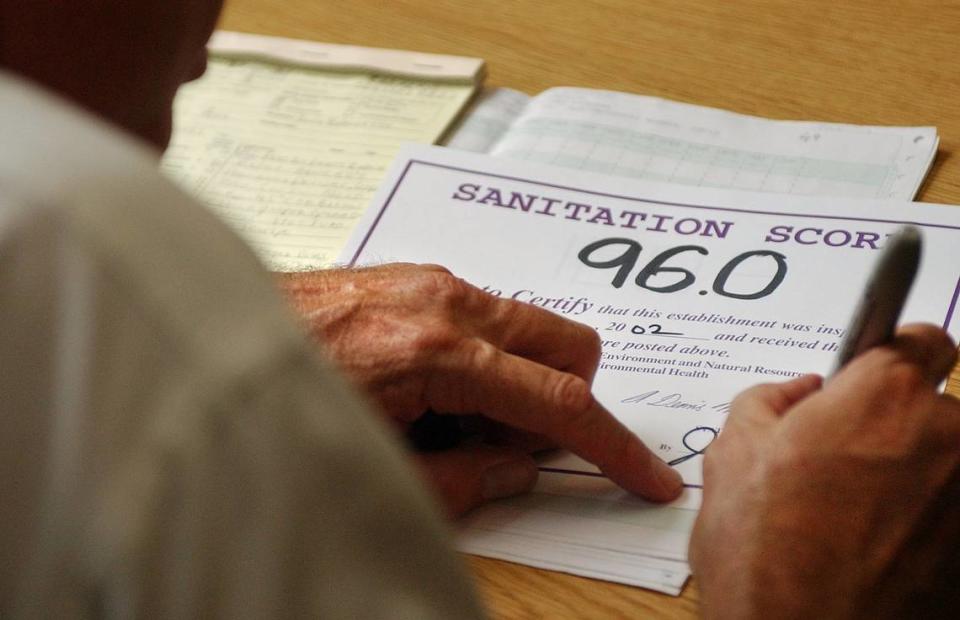Is your bar food safe to eat? Why NC inspectors are enforcing new ‘minimum standards’
As potentially hundreds of Charlotte-area bars face changes to their operations under a new state law, Mecklenburg County public health officials are working to make sure they’re ready, too.
Under a provision included in a health care bill passed in September, bars that prepare or serve food that requires temperature and time control must get a health department permit like a restaurant. The change was intended to address a loophole in state law that meant those businesses previously weren’t subject to inspections and sanitation scores.
While the new law took effect Jan. 1, the state health department extended the compliance deadline to March 27.
In Mecklenburg County alone, 268 businesses could be affected, according to Mecklenburg County Public Health
Public health officials have worked since October to help those bars prepare, County Health Director Raynard Washington told The Charlotte Observer. And the moment of compliance is less than two months away.
Health officials also are working to make sure they’re set up to take on the additional work to permit and inspect many more facilities.
Why weren’t bars inspected previously?
The gap in state law that allowed businesses to serve hot food without inspections stemmed from recent changes to North Carolina’s alcohol laws.
A 2022 law created a new “bar” category, allowing bars that make most of their revenue from the sale of alcohol to no longer be subject to certain membership requirements, The News & Observer reported previously. It also led to those bars being able to sell food without inspections as long as food sales weren’t their largest source of revenue.
Those changes led the state Department of Health and Human Services to push legislators to add in new regulations, a DHHS spokesperson told The N&O.
While it’s possible many of the affected businesses were already following best practices for food safety, Washington noted, the way things were structured meant a lack of “a check and balance.”
“These are important protections and controls to have in place when you are cooking, preparing food and serving it to residents,” he said.
Mecklenburg County was at the forefront of the discussion over the lack of inspections earlier in 2023, when a person got food poisoning from oysters served at a NoDa business that fell into the unregulated bar category. The business said the issue stemmed from their supplier, not their handling of the seafood, Observer news partner WSOC-TV reported at the time.
Washington said it’s difficult to know whether other people became sick after consuming food from an uninspected bar because many who get food poisoning attribute their symptoms to other causes and don’t report it.
“What we’re trying to do is minimize the risk with ensuring that there are some level of minimum standards of control in place in terms of hygiene, as well as handling, storage, labeling and preparation,” he said.
How new food inspections will affect Charlotte bars

Under the new law, bars serving food with time or temperature requirements, known as “TCS foods,” must get a Health Department Food Service Establishment operating permit. They’ll undergo health inspections and receive posted sanitation scores like restaurants.
Bars that only serve “garnishes and unopened, packaged food” don’t need a permit, the department adds, and “country clubs that hold non-profit status” are exempt.
The county health department worked with the Alcoholic Beverage Control Commission to put together a list of potentially affected businesses, Washington said.
Facilities that have never had this type of permit must hire “an architect or certified engineer to draw up plans to submit to Mecklenburg County Code Enforcement” as part of a plan review, the county says in its guide for owners. Facilities that previously had a permit will still undergo an inspection before getting a new permit, but they may not need a full plan review.
While the county estimates more than 260 businesses are affected, the number of bars who have to undergo a full plan review could change as public health officials work with each bar.
Chrystal Swinger, who leads the county health department division in charge of inspections, said some affected businesses have started permit work while others “are choosing to scale back on what they are serving” rather than go through the process.
“We want to give (businesses) as much time and information and education as possible to make a good decision for their business practices,” she said.
Once permitted, bars will undergo inspections two or three times a year, depending on how much temperature-controlled food they serve, according to Swinger.
“It just depends on their menu,” she said.
Washington said the health department hired more staff “for the last few years” to help keep up with “a significant increase in the number of establishments that were responsible for inspecting.”
“So we are sort of naturally prepared for more demand,” he said of the added workload from bars.
How to look up health inspections for Charlotte businesses
Anyone can look up inspection records on the health department’s Food and Facilities Inspections site. Reports available there include a score and letter grade based on what health inspectors find, along with a list of health violations.
Patrons can also view an establishment’s latest inspection on Yelp, the health department notes.
“I encourage folks to take a look at it,” Washington said of publicly available information about restaurants.
Complaints can be filed with the health department by calling 980-314-1620, submitting a report online or mailing feedback to 3205 Freedom Drive, Suite 8000, Charlotte, NC 28208.

